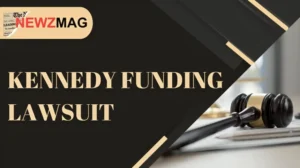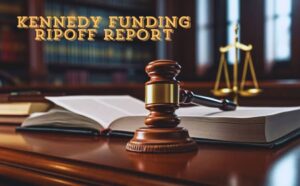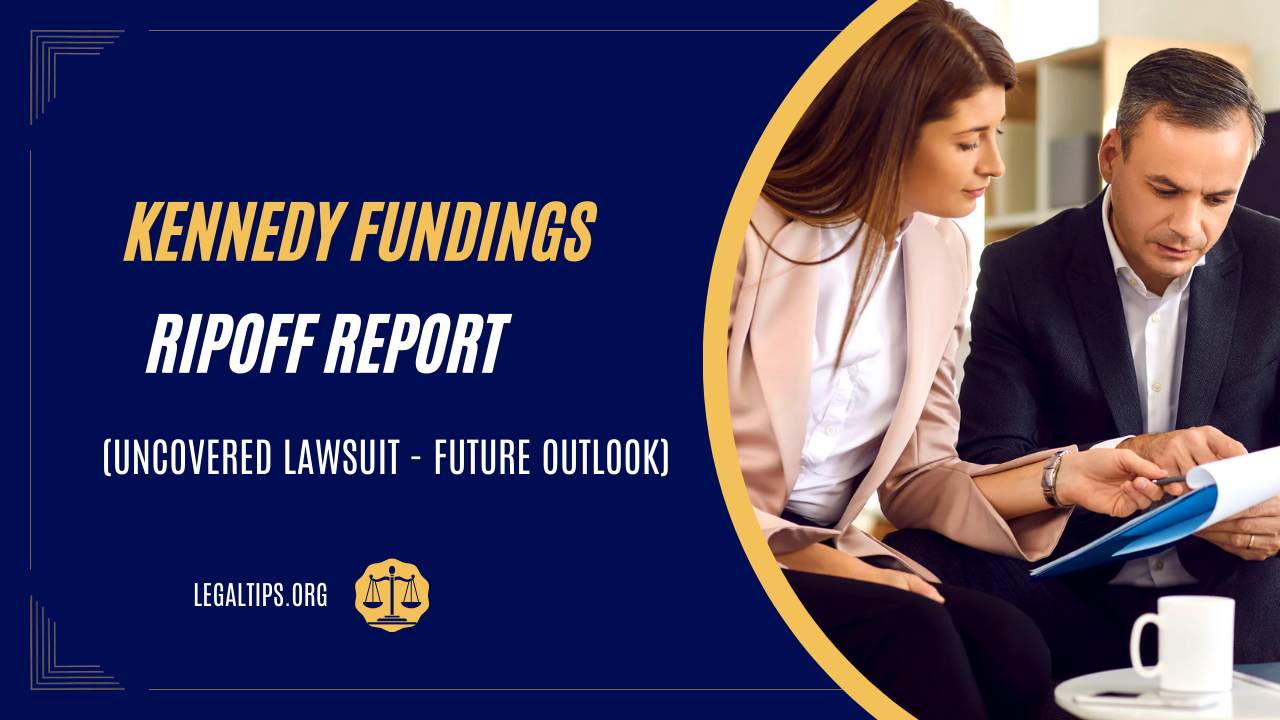Kennedy Funding Lawsuit? is a well-known commercial real estate lender that specializes in offering bridge loans to businesses and investors who need quick access to capital. With over 35 years of experience, Kennedy Funding has carved a niche in the market by providing financing for a wide variety of projects, including land acquisition, development, and distressed asset purchases.
However, like many financial institutions, Kennedy Funding has found itself involved in various lawsuits over the years. Legal battles involving the company typically center around loan terms, repayment disputes, and borrower-lender disagreements. This article explores the background of Kennedy Funding lawsuits, key cases, common issues, and what you need to know if you’re dealing with this lender or similar litigation.

What is Kennedy Funding?
Before diving into the lawsuit specifics, it’s essential to understand what Kennedy Funding does and how they operate. Kennedy Funding is a direct private lender that provides loans, often at high-interest rates, to businesses that need fast, short-term financing.
Their expertise lies in providing funding for unconventional or hard-to-finance projects. This includes bridge loans for real estate, construction loans, and financing for international real estate deals. Due to the nature of these deals, Kennedy Funding often works with clients who are unable to secure funding through traditional banks.
LSI Keywords: commercial real estate lender, Kennedy Funding bridge loans, private lender lawsuits, alternative financing litigation, real estate lender lawsuits.
Common Issues in Kennedy Funding Lawsuits
While Kennedy Funding has been a key player in the lending space, disputes are not uncommon in the financial world. Most lawsuits involving Kennedy Funding revolve around disagreements between the lender and the borrower on several points, including:
1. Loan Terms and Interest Rates
One of the most frequent areas of dispute in lawsuits against Kennedy Funding is the terms of the loans. Given that Kennedy Funding provides loans in situations where borrowers have limited options, the loan terms often include high interest rates, short repayment periods, and substantial penalties for late payments. Borrowers sometimes claim that these terms are predatory or were not clearly explained at the outset.
2. Default and Foreclosure
Lawsuits may also arise when a borrower defaults on a loan and Kennedy Funding initiates foreclosure proceedings. Borrowers who fall behind on payments may argue that Kennedy Funding acted unfairly or did not give them sufficient opportunity to remedy their financial situation. In some cases, borrowers have filed lawsuits claiming that they were misled about the terms of default or that Kennedy Funding’s actions violated lending regulations.
3. Breach of Contract
Another common legal issue is the accusation of breach of contract. Borrowers may file lawsuits against Kennedy Funding, claiming that the lender did not honor the terms of the loan agreement, such as failing to disburse funds according to the contract. On the other hand, Kennedy Funding may counter-sue borrowers for not meeting the conditions stipulated in the loan agreement.
4. Fraud Allegations
In more severe cases, some lawsuits involve accusations of fraud. Borrowers might claim that Kennedy Funding misrepresented the loan’s terms or engaged in deceptive practices to entice borrowers into agreements they couldn’t sustain. These types of allegations can lead to long and complicated legal battles.
LSI Keywords: loan disputes, foreclosure lawsuits, breach of contract in lending, predatory loan claims, lender-borrower fraud cases, commercial lending disputes.
Key Kennedy Funding Lawsuits
Here are some of the most notable lawsuits that have involved Kennedy Funding over the years. While not exhaustive, these cases highlight the nature of disputes that can arise between lenders and borrowers.
Case 1: XYZ Development Group vs. Kennedy Funding
In this case, XYZ Development Group, a real estate developer, took out a bridge loan from Kennedy Funding to finance the construction of a new commercial property. However, after experiencing delays in the project, XYZ defaulted on the loan. Kennedy Funding initiated foreclosure proceedings, which led XYZ to file a lawsuit, claiming that Kennedy Funding had misrepresented the terms of the loan and failed to disburse funds promptly, causing delays.
The court found in favor of Kennedy Funding, stating that the terms of the loan were clear and that XYZ was responsible for its own project delays.

Case 2: ABC Holdings vs. Kennedy Funding
ABC Holdings, a real estate investment firm, sued Kennedy Funding for breach of contract, claiming that the lender failed to fund the full loan amount agreed upon. ABC Holdings argued that Kennedy Funding’s actions caused significant financial harm, as they were unable to complete the purchase of a distressed property.
Kennedy Funding countered that ABC Holdings failed to meet certain conditions required for the loan disbursement. The lawsuit was settled out of court, with terms undisclosed.
Case 3: Doe Enterprises vs. Kennedy Funding
In this high-profile case, Doe Enterprises, a multinational corporation, alleged that Kennedy Funding engaged in predatory lending practices. They claimed that the interest rates and penalties were so high that they were set up for failure from the beginning. The lawsuit was drawn out, with both parties presenting extensive documentation.
Eventually, the court ruled in favor of Kennedy Funding, stating that Doe Enterprises was a sophisticated borrower and had agreed to the terms of the loan with full understanding.
LSI Keywords: Kennedy Funding court cases, real estate litigation, bridge loan lawsuits, legal disputes in commercial lending, breach of loan agreement cases.
How to Avoid Legal Disputes with Lenders
If you’re considering taking a loan from Kennedy Funding or any other private lender, it’s essential to protect yourself by understanding the terms fully and mitigating potential legal risks. Here are a few tips to avoid ending up in a lawsuit:
1. Read the Fine Print
Make sure you understand every aspect of the loan agreement. Pay particular attention to the interest rates, penalties, and default terms. Don’t hesitate to ask for clarification on anything that seems unclear.
2. Negotiate Terms
Before signing a loan agreement, negotiate the terms to make sure they align with your financial situation. Private lenders are often more flexible than traditional banks, so there may be room to adjust the terms.
3. Maintain Open Communication
If you run into financial trouble, communicate with your lender as soon as possible. They may be willing to work out a solution to help you avoid defaulting, such as adjusting payment schedules.
4. Consult a Lawyer
Having legal counsel review the loan documents before signing can save you from potential lawsuits down the line. A lawyer will ensure that the contract is fair and that you’re not agreeing to unfavorable terms.
LSI Keywords: avoid lender lawsuits, private loan negotiations, legal review of loan agreements, tips for avoiding loan disputes, borrower protection strategies.
What Happens if You’re Sued by Kennedy Funding?
If you find yourself involved in a lawsuit with Kennedy Funding or any lender, here’s what you should expect:
1. Receive a Notice of Lawsuit
The first step is receiving a formal notice that you are being sued. This notice will outline the claims against you and the legal grounds for the lawsuit. Make sure to respond promptly and hire a lawyer if you haven’t already.

2. Prepare Your Defense
Your lawyer will help you build a defense, which may include gathering evidence such as payment records, email communications, and documentation of the loan terms.
3. Negotiate a Settlement
In many cases, lawsuits are settled before going to trial. Both parties may agree to a settlement, which could involve modifying the loan terms or agreeing to a repayment plan.
4. Go to Court
If the case doesn’t settle, it will go to court, where a judge or jury will decide the outcome. This can be a lengthy and expensive process, so settling is often in the best interest of both parties.
LSI Keywords: defending against a lender lawsuit, borrower legal defense, settle loan disputes, lawsuit response steps, legal representation in loan disputes.
FAQs
1. What are the most common reasons for Kennedy Funding lawsuits?
The most common reasons include disputes over loan terms, foreclosure proceedings, breach of contract claims, and fraud allegations.
2. Are Kennedy Funding loans considered predatory?
While some borrowers have accused Kennedy Funding of predatory lending, courts have generally ruled in favor of Kennedy Funding, stating that borrowers were aware of the loan terms. Always read and understand loan agreements before signing.
3. Can Kennedy Funding sue me if I default on a loan?
Yes, Kennedy Funding can initiate legal action if you default on your loan. This may include foreclosure or a breach of contract lawsuit.
4. How can I protect myself from a lawsuit with Kennedy Funding?
To protect yourself, ensure that you fully understand the loan terms, negotiate favorable conditions, and maintain open communication with the lender. Consulting a lawyer before signing any agreement is also advisable.
5. Is it possible to settle a lawsuit with Kennedy Funding out of court?
Yes, many lawsuits are settled out of court to avoid the lengthy and costly trial process. Settlements often involve negotiating new payment terms or other agreements that benefit both parties.
6. What should I do if Kennedy Funding sues me?
If you are sued by Kennedy Funding, consult with an attorney immediately. Your lawyer will help you understand your legal options and develop a defense strategy.
Conclusion
Navigating legal disputes with a lender like Kennedy Funding can be complex and daunting, especially if you’re unfamiliar with the intricacies of loan agreements and litigation. However, with proper preparation, legal advice, and a clear understanding
